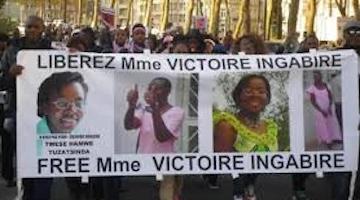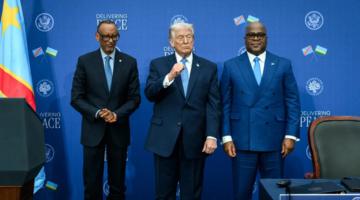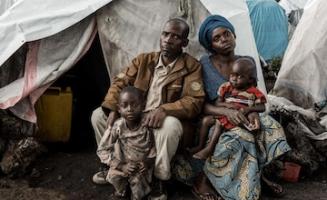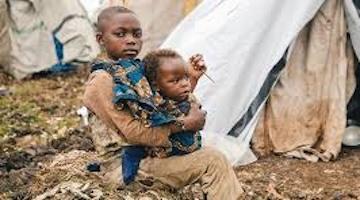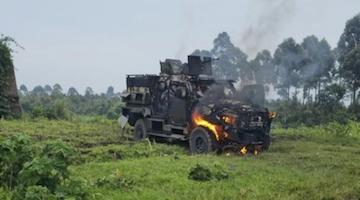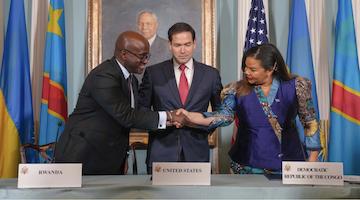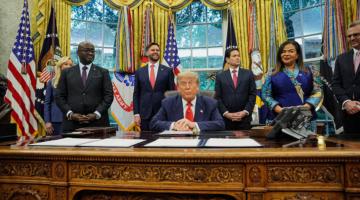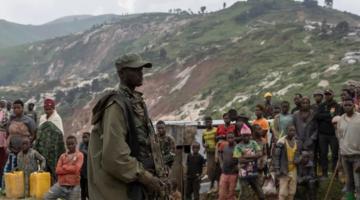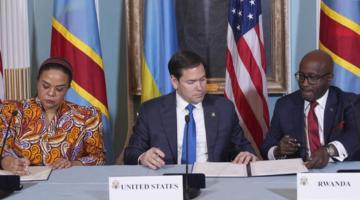Anti-imperialist Dilemma: What If the US is “Right” About the Election in DR Congo?
The US may, for once, be doing the right thing in the Congo, although undoubtedly for its own imperial reasons.
“The Congolese people no doubt voted to reject the Kabila regime as much as anything else, not to elect a Kabila collaborator.”
With regard to foreign conflict, Ajamu Baraka has said, “You have to ask yourself when the US has intervened on the side of the people. And the answer is: Never.” That’s my own rule of thumb regarding US “interventions,” and no doubt that of most BAR readers. However, the Democratic Republic of the Congo (DRC) poses a consequent dilemma: What if the US is supporting the candidate, Martin Fayulu, who most likely won the 12/30/2018 election in DRC?
How can we discount the will of the Congolese people—assuming they did elect Fayulu—simply because it coincides with that of the US for whatever reason? Wouldn’t that be as paternalistic as the US foreign policy we abhor, even with US combat troopsin Gabon, prepared to invade DRC if so ordered? Only the Congolese people can claim their own agency.
The election should have taken place two years earlier, but at that time, President Joseph Kabila and his ruling party told the Congolese that the country lacked the necessary infrastructure to hold a nationwide election, reflecting their own failure to build the transportation and communications networks essential to a modern domestic economy and political system. Kabila’s candidate, Emmanuel Shadary, so clearly lost the election that Kabila couldn’t steal it for him. Instead, he appears to have struck a deal with Félix Tshisekedi, who was most likely the second place candidate. And the Congolese people no doubt voted to reject the Kabila regime as much as anything else, not to elect a Kabila collaborator.
“The Catholic Church reported that its data does not coincide with that of the national electoral commission, which is to say that Fayulu won.”
Fayulu, as I wrote here last week, is no Lumumba. He is a former Exxon-Mobil executive turned parliamentarian, but he appears to be the candidate they have chosen.
How can we know who won?
The Congolese Catholic Church is the second most influential institution in DRC, second only to the government’s army and police, and it has more credibility than Kabila, his ruling party, and the institutions they control. Catholic clergy have been arrested, kidnapped, and brutally beaten for leading protests against the Kabila regime, which has now clung to power for 18 years.
The Church fielded 40,000 trained election observers and reported that its data does not coincide with that of the national electoral commission, which is to say that Fayulu won, even if they decline to name him the winner. They have asked the national electoral commission to publish their data collected at polling stations, but it has refused.
DRC and the West
At the January 11 UN Security Council meeting, Acting US Ambassador Jonathan R. Cohen said, “We remain prepared to hold accountable individuals who threaten the peace, stability, or security of the DRC, or undermine the DRC’s democratic process.” The State Department similarly exaggerated US jurisdiction in the press release on its website.”
On January 21, New Jersey Congressman Chris Smith, former Chairman of the House Foreign Relations Subcommittee on Africa, issued the following statement:
“All parties should heed the statement of the African Union that calls for ‘the suspension of the proclamation of the final results of the elections.’ If [Felix] Tshisekedi is installed this week notwithstanding the tainted results, the United States should not hesitate to apply visa denials, sanctions and other tools against those complicit in election fraud.”
On the same day Congolese were arrested outside Martin Fayulu’s headquarters while waiting for him to arrive and address a rally against election fraud denying him the presidency.
One day later, the Congolese government declared that it would delay the inauguration of Félix Tshisekedi, which had been scheduled for Thursday, January 24. Both US pressure and potential unrest were no doubt factors in Kabila’s decision.
DRC, Russia and China
Russia and China have both expressed support for the existing DRC government, as they have in Syria and Burundi, Africa’s Syria. (The West and its client state Rwanda have been determined to topple Pierre Nkurunziza, the sitting president of Burundi, but Russia and China have rightly defended Burundi’s sovereignty on the UN Security Council. Rwanda and Burundi have engaged in a low intensity conflict since 2015, with the US behind Rwanda, Russia and China behind Burundi, but without direct military engagement.)
However, should this determine how we understand the electoral standoff in DRC? Nearly a century and a half of brutal, ongoing imperialism has drastically constrained the Congolese people’s options and Martin Fayulu appears to be the option they have chosen within these constraints. Shouldn’t we respect it, despite understanding the its imperial context?
What’s crystal clear
At least a few things are crystal clear. One is that President Kabila has successfully divided the opposition between Tshisikedi and Fayulu supporters. Consequent violence could give him an excuse to remain in power.
Another is the immense geostrategic significance of DRC, a nation larger than Western Europe in the heart of Black Africa. Access to some share of its immense resource wealth, most of all its strategic mineral reserves, is an existential imperative for most of the world’s most powerful nations. (All except resource-rich Russia, whose only resource shortage is bauxite, which they extract in Guinea. That doesn’t mean that Russia has no business or strategic interests in DRC, only that its weapons manufacturing and other industries do not depend on it.)
The world’s hunger for Congo’s resource wealth has caused untold suffering for the Congolese people since colonization in 1879. (It became “The Congo Free State,” Belgian King Leopold’s personal property, in 1885.)
In the face of all this, eminent Congolese author Patrick Mbeko penned an open letter to Martin Fayulu, whom he believes to have won the election, during the second week of January.
Open Letter to Martin Fayulu by Patrick Mbeko
Dear Martin Fayulu Madidi,
I have never been enthusiastic about elections in a country that is occupied or deprived of full sovereignty. I’ve never believed in the need to organize elections in a failed state. You know as well as I do that the Democratic Republic of Congo (DRC) is not in a position to be able to organize elections that are credible and transparent. You know, as well as I and so many of our compatriots know, that the elections in which we just took part were a trap. We warned you, but you didn’t want to listen. You refused to listen to reason despite experience with the sham elections of 2006 and 2011. You thought you could put an end to the Kabila system by playing according to the rules of a system totally controlled by Kabila. You mistakenly thought that you could repeat the same errors of the past and yet come out with different results. That is what Albert Einstein called “insanity.”
You played and you lost. But luckily for you, the Congolese people, who believed in you, refused to give up. They went to you during the electoral campaign, though you were said to have no political base. They shouted your name at the top of their lungs when you were only at the beginning of an obscure campaign on the national political scene. They rejected the opposition of compromise and betrayal and finally they chose you.
“The elections in which we just took part were a trap.”
Yes, we all know that you are the one who was overwhelmingly chosen by the mothers of Lubumbashi, the fathers of Équateur, the youth of Central Congo and on and on. You are the choice of the Congolese people. The choice of those millions of men, women, and young people who braved heavy rain, waited for hours at the voting stations to mark a ballot showing your face from a machine that came from God-knows-where. Don’t forget it.
Even if I didn’t vote like the rest of the diaspora, even if I do not always agree with you on a certain number of subjects, you are henceforth our president. Unless you decide to accept the unacceptable. Which doesn’t seem to be an option for you. For make no mistake, Mr. President, those you are working for, the Congolese people, expect strong action from you to restore that dignity that was taken from them and confiscated by you know who.
The Congolese people are watching you intently. You offered them a political program during the election campaign. Today, they want you to speak out and set priorities. Just one, two, three words. Words that will issue from a human voice but which will resound on the hills of North and of South Kivu, which have suffered from pain, horror and death. They will resound with such force that I believe they will restore joy and hope to millions of Congolese once they have heard the forces of the status quo and their long hidden allies in the opposition have been swept away.
“Engage the battle on every level against the forces of evil which have taken the Congolese people hostage for nearly 20 years.”
I am aware of the enormity of the task before you. You are faced with a monstrous tyranny, unequalled in the dark and desolate annals of crime. But know that you are not alone. The Congolese who voted for you are and will be at your side. To echo the words of Winston Churchill, you have nothing to offer but blood, sweat and tears. You have a single choice: engage the battle on every level against the forces of evil which have taken the Congolese people hostage for nearly 20 years and which are ready to prolong their suffering in the interests of certain of our power-hungry compatriots. It is a test that will certainly be painful. But under your leadership the Congolese will triumph. “The people always win”, said the late Rossy Mukendi. The people. Those, I repeat, who chose you despite the manipulations of the national electoral commission. “Victory at all costs and in spite of all terrors; victory, however long and hard the road may be, for without victory there is no survival."
May the God you pray to protect you and may the ancestors watch over this land that the Almighty gave them and that they bequeathed to us.
Patrick MBEKO
Investigative Journalist and Author who loves the Congo and its people
(Translated from French by Diana Johnstone.)
Patrick Mbeko is the author of “Stratégie du chaos et du mensonge: Poker menteur en Afrique des Grands Lacs,” “Le Canada et le Pouvoir Tutsi du Rwanda: Deux décennies de complicité criminelle en Afrique centrale,” and “Objectif Kadhafi: 42 ans de guerres secrètes contre le Guide de la Jamahiriya arabe libyenne.”
Ann Garrison is an independent journalist based in the San Francisco Bay Area. In 2014, she received the Victoire Ingabire Umuhoza Democracy and Peace Prizefor her reporting on conflict in the African Great Lakes region. She can be reached at ann@anngarrison.com.
COMMENTS?
Please join the conversation on Black Agenda Report's Facebook page at http://facebook.com/blackagendareport
Or, you can comment by emailing us at comments@blackagendareport.com

